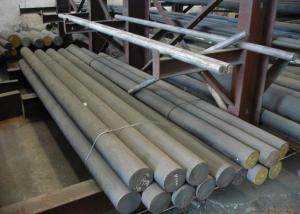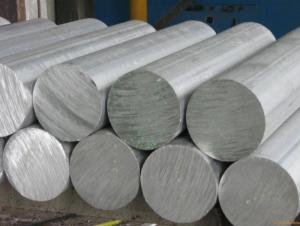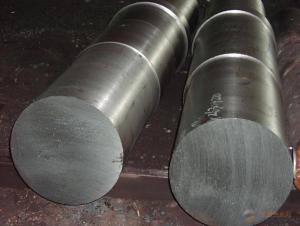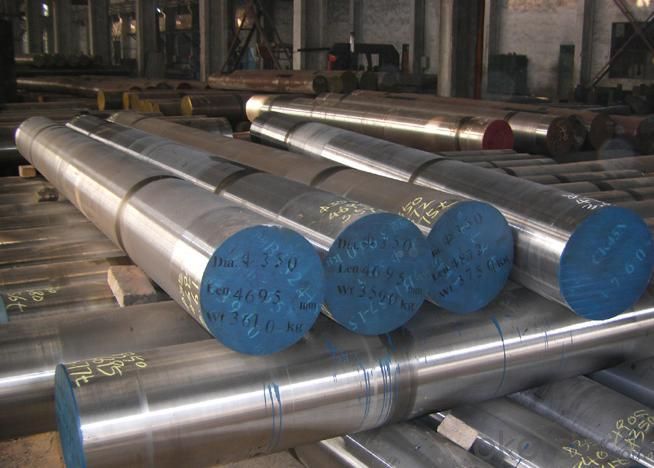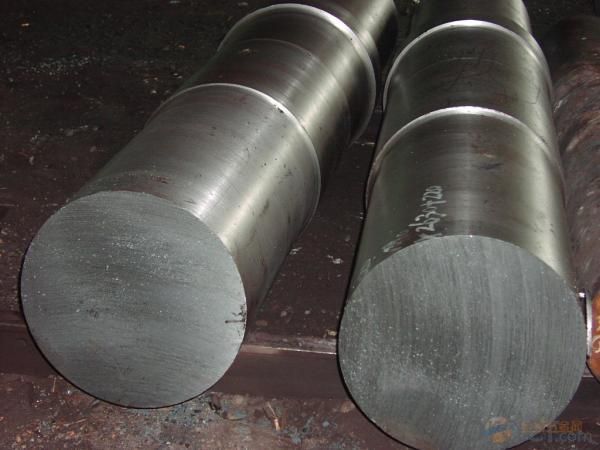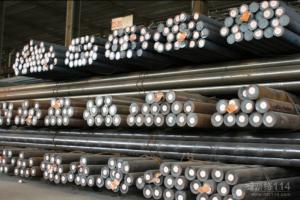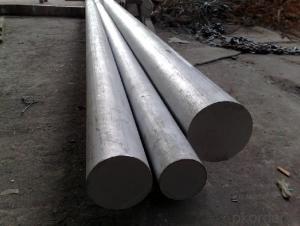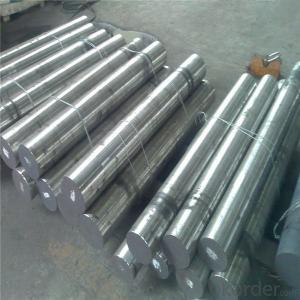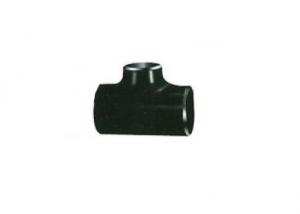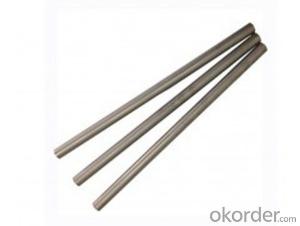Alloy Steel of Bearing
- Loading Port:
- Guangzhou
- Payment Terms:
- TT or LC
- Min Order Qty:
- 25MT m.t.
- Supply Capability:
- 600000 Tons/Year m.t./month
OKorder Service Pledge
OKorder Financial Service
You Might Also Like
Specifications of Alloy Steel For Bearing
1. Grade: AISI 52100, ASTM E52100, DIN 1.3505,JIS SUJ2, GCr15
|
100Cr6 |
52100 |
SUJ2 |
GCr15 |
|
100CrMo7 |
100CrMo7 |
SUJ5 |
GCr18Mo |
|
20CrMo4 |
4118H |
SCM418 |
G20CrMo |
|
20NICrMo2 |
8520H |
SNCM220 |
G20CrNiMo |
|
- |
- |
440C |
9Cr18 |
|
X108CrMo17 |
S44004 |
440C |
9Cr18Mo |
2. Specification: Diameter: 5.5~350mm Length: 2000-6000mm or as required
3. Steel Grade: Bearing Steel
4. Certification: ISO9001-2000; CE, UL
5. Inspection: 100% Ultrasonic according to the test standards: SEP1921-84, GR.3 CLASS C/C
6. Packing situation: standard seaworthy packing or as customer required
7. Heat treatment:
Soft annealing: heat to 680-720°C, cool slowly.
Hardness after annealing: Max. 241 HB
Hardening: 820 - 850 °C
Normalizing temperature: 840-880°C
Tempering: 540-680°
Usage and Applications of Alloy Steel For Bearing
Alloy steel is used in making all kinds of bearing ring and rolling elements, like combustion engine, machine tool, and bearings for melting machine; also used for making tools and measuring tools.
Bearing steels are used for ball and roller bearing applications and are comprised of low carbon steels and high carbon through harden able steel.
Alloy Steel can be used in machine parts and engineering components.
Applications range: Chemical fertilizer pipe, building, machinery, textile industry, etc
Packaging & Delivery of Alloy Steel For Bearing
Packaging Detail: Standard seaworthy packing or as customer required; Packed in bundles with standard export sea-worthy package or as customer require
Delivery Detail: 45 days after order confirmed
Delivery condition: Black, peeled, machined
Trade terms: FOB, CFR, CIF
MOQ: 25 tons or at customer's demands
Production Flow of Alloy Steel For Bearing
Process: EAF+LF+VD+ Hot Rolled(Forged)+ Heat Treatment (Annealed, A Normalized, Q+T)
The processing is hot rolled (strictly control sulphur, phosphorus and non-metallic inclusions content and distribution).
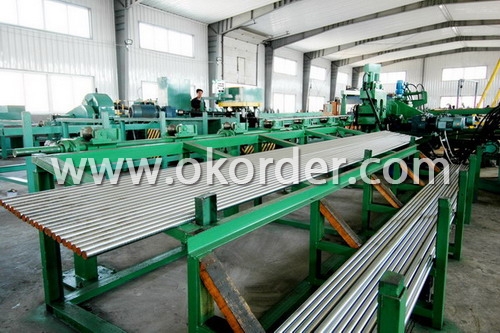
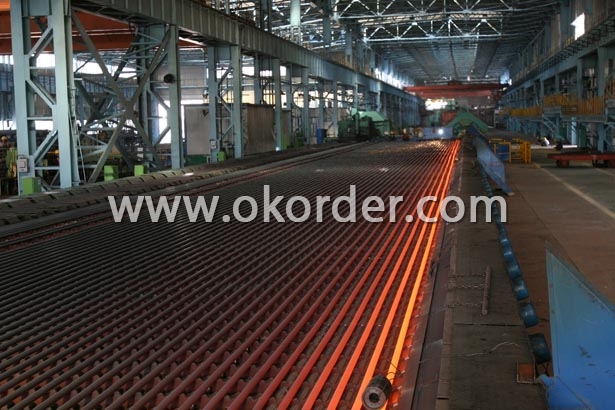
Product Advantages of Alloy Steel For Bearing
1. Good comprehensive properties
2. Good performance in cutting and processing after spheroids annealing
3. High hardness and homogenization after quenching and tempering
4. High abrasive resistance and fatigue resistance
5. Large amount of metal elements
6. High abrasion resistant SAE 52100 bearing steel
7. Steel GCr15 is the most widely used bearing steel
Quality Assurance of Alloy Steel for Bearing
We are the ISO 9001:2000 authentication enterprises and we can provide the enterprise's quality written guarantee for all the exported products.
Certificate of quality is issued in English, in addition the normal terms, production process, the mechanical property (yield strength, tensile strength, elongation and hardness. forged ratio, UT test result, Grain size, heat treatment methods and the sample of is shown on the certificate of quality.
- Q: What are the specific requirements for special steel used in the railway wheel industry?
- The specific requirements for special steel used in the railway wheel industry include high strength, durability, and resistance to wear and fatigue. The steel must have excellent mechanical properties to withstand heavy loads and impact forces. It should also have good heat treatment characteristics to ensure proper hardness and toughness. Additionally, the steel must meet strict dimensional and geometrical specifications to ensure compatibility with the railway system.
- Q: How does special steel perform in extreme cold temperatures?
- Special steel is custom-made to excel under frigid conditions, with alloys that possess a high level of low temperature ductility. This quality enables the steel to maintain its structural integrity even in the harshest cold settings, making it a popular choice in Arctic exploration, oil and gas operations in cold regions, and the aerospace industry. A key distinguishing feature of special steel is its resistance to brittleness when exposed to low temperatures. Unlike regular steel, which becomes brittle and susceptible to cracking in extreme cold, special steel retains its toughness, rendering it suitable for sub-zero conditions. This remarkable attribute is achieved through meticulous selection and control of the alloy's composition, allowing for a superior balance between strength and ductility. Moreover, special steel boasts exceptional resistance to corrosion, a particularly crucial trait in cold environments where exposure to snow, ice, and moisture is prevalent. The alloying elements present in special steel, such as chromium and nickel, generate a protective oxide layer on the surface, successfully preventing corrosion and preserving the steel's structural integrity. Additionally, special steel exhibits remarkable thermal conductivity, enabling efficient heat transfer even in extremely cold temperatures. This thermal property is of paramount importance in applications where effective heat management is essential, such as in the aerospace industry or in equipment operating in cold climates. In summary, special steel is meticulously engineered to excel in extreme cold temperatures. Its low temperature ductility, resistance to brittleness, corrosion resistance, and thermal conductivity establish it as a dependable and enduring material for diverse applications in cold environments.
- Q: Can special steel be used in the railway industry?
- Yes, special steel can be used in the railway industry. Special steel, such as high-strength steel or corrosion-resistant steel, can be utilized for various applications in the railway industry, including the construction of tracks, bridges, and locomotives. These types of steel offer enhanced durability, strength, and resistance to wear and tear, making them suitable for the demanding conditions and heavy loads encountered in the railway sector.
- Q: What are the requirements for special steel used in military applications?
- The requirements for special steel used in military applications typically include high strength, toughness, and durability to withstand extreme conditions and heavy impact. It should have excellent resistance to corrosion, wear, and fatigue to ensure long-term performance. The steel must also possess good weldability and machinability for ease of fabrication and maintenance. Additionally, it should meet stringent specifications and standards set by military organizations to ensure reliability, safety, and compatibility with other materials and systems.
- Q: What are the different surface hardening techniques used for special steel?
- There are several surface hardening techniques used for special steel, including carburizing, nitriding, induction hardening, flame hardening, and laser hardening.
- Q: Can special steel be used in the food packaging industry?
- Yes, special steel can be used in the food packaging industry. Special steel alloys, such as stainless steel, are commonly used in food packaging due to their corrosion resistance, durability, and ability to maintain product integrity. These properties make special steel suitable for applications where hygiene, safety, and longevity are essential, making it an ideal choice for various food packaging materials and equipment.
- Q: What are the properties of nitriding steel?
- Nitriding steel is a type of steel that undergoes a surface treatment process called nitriding. The main properties of nitriding steel include increased hardness, improved wear resistance, enhanced fatigue strength, and increased corrosion resistance. This is achieved by introducing nitrogen into the surface layer of the steel, forming a hard compound called nitrides. Nitriding steel also exhibits a low coefficient of friction, making it suitable for applications where sliding or rubbing contact occurs. Additionally, nitriding steel retains its core toughness and ductility, making it an ideal choice for components subjected to high-stress conditions.
- Q: How does special steel perform in corrosive environments?
- Special steel is specifically designed to perform well in corrosive environments. It is made with a higher content of alloying elements such as chromium, which forms a protective oxide layer on the surface of the steel. This oxide layer acts as a barrier, preventing the steel from coming into direct contact with the corrosive elements in the environment. Additionally, special steel may also contain other alloying elements such as molybdenum, nickel, or copper, which further enhance its resistance to corrosion. These elements help to increase the steel's ability to withstand pitting, crevice corrosion, and stress corrosion cracking, which are common types of corrosion that occur in corrosive environments. Furthermore, special steel is often treated with various surface coatings or finishes that provide additional protection against corrosion. These coatings can include zinc, epoxy, or polymeric materials, which create an additional barrier between the steel and the corrosive elements. In summary, special steel performs exceptionally well in corrosive environments due to its high content of alloying elements, protective oxide layer, and additional surface coatings. It offers excellent resistance to various forms of corrosion and ensures the longevity and reliability of structures or equipment operating in such environments.
- Q: What are the properties of aluminum alloys?
- Aluminum alloys possess a wide range of desirable properties such as high strength-to-weight ratio, excellent corrosion resistance, good thermal conductivity, and electrical conductivity. They also exhibit good formability, allowing for a variety of manufacturing processes such as extrusion, casting, and machining. Additionally, aluminum alloys can be easily joined using various welding techniques, making them versatile materials for numerous applications in industries such as aerospace, automotive, construction, and consumer goods.
- Q: What are the different heat treatment grades of special steel?
- There are several different heat treatment grades of special steel, each with its own unique properties and applications. Some of the commonly used heat treatment grades include: 1. Annealed Steel: This grade of special steel is treated through the annealing process, which involves heating the steel to a specific temperature and then cooling it slowly to enhance its ductility and reduce its hardness. Annealed steel is typically used in applications where toughness and machinability are required. 2. Normalized Steel: Normalizing is a heat treatment process that involves heating the steel above its critical temperature and then cooling it in still air. This treatment refines the grain structure of the steel, improves its mechanical properties, and reduces internal stresses. Normalized steel is often used in applications where high strength and good weldability are desired. 3. Quenched and Tempered Steel: This grade of special steel undergoes a two-step heat treatment process. Firstly, the steel is heated to a high temperature and then rapidly cooled in a quenching medium such as oil or water. This process results in a hardened and brittle steel. To regain some toughness and reduce brittleness, the steel is then tempered by reheating it to a lower temperature. Quenched and tempered steel is commonly used in applications that require high strength, such as construction machinery, mining equipment, and automotive parts. 4. Precipitation Hardening Steel: This grade of special steel is treated by a combination of heat treatment and precipitation hardening. The steel is initially solution treated at high temperatures to dissolve alloying elements, followed by rapid cooling to retain a supersaturated solid solution. Subsequently, the steel is aged at a lower temperature for a specific period of time, allowing the formation of fine precipitates that contribute to increased strength and hardness. Precipitation hardening steel is utilized in applications where high strength and corrosion resistance are essential, such as aerospace components and high-performance tools. 5. Case Hardening Steel: Case hardening is a surface heat treatment process used to increase the hardness of the outer layer of steel while maintaining a tough and ductile core. This is achieved by carburizing or nitriding the steel, which introduces carbon or nitrogen into the surface layer, respectively. Case hardening steel is commonly used in applications requiring wear resistance, such as gears, bearings, and camshafts. These are just a few examples of the various heat treatment grades available in special steel. Each grade offers unique properties and advantages, allowing for a wide range of applications across different industries.
1. Manufacturer Overview
| Location | Guangdong, China |
| Year Established | 2005 |
| Annual Output Value | Above US$ 100 Million |
| Main Markets | korea, India, Malaysia, Brazil, Germany, Belgium, Middle East |
| Company Certifications |
2. Manufacturer Certificates
| a) Certification Name | |
| Range | |
| Reference | |
| Validity Period |
3. Manufacturer Capability
| a) Trade Capacity | |
| Nearest Port | Guangzhou |
| Export Percentage | 50%-80% |
| No.of Employees in Trade Department | 21-100 People |
| Language Spoken: | English; Chinese |
| b) Factory Information | |
| Factory Size: | 23,000 square meters |
| No. of Production Lines | 1 |
| Contract Manufacturing | OEM servise offered |
| Product Price Range | high; average |
Send your message to us
Alloy Steel of Bearing
- Loading Port:
- Guangzhou
- Payment Terms:
- TT or LC
- Min Order Qty:
- 25MT m.t.
- Supply Capability:
- 600000 Tons/Year m.t./month
OKorder Service Pledge
OKorder Financial Service
Similar products
Hot products
Hot Searches
Related keywords

